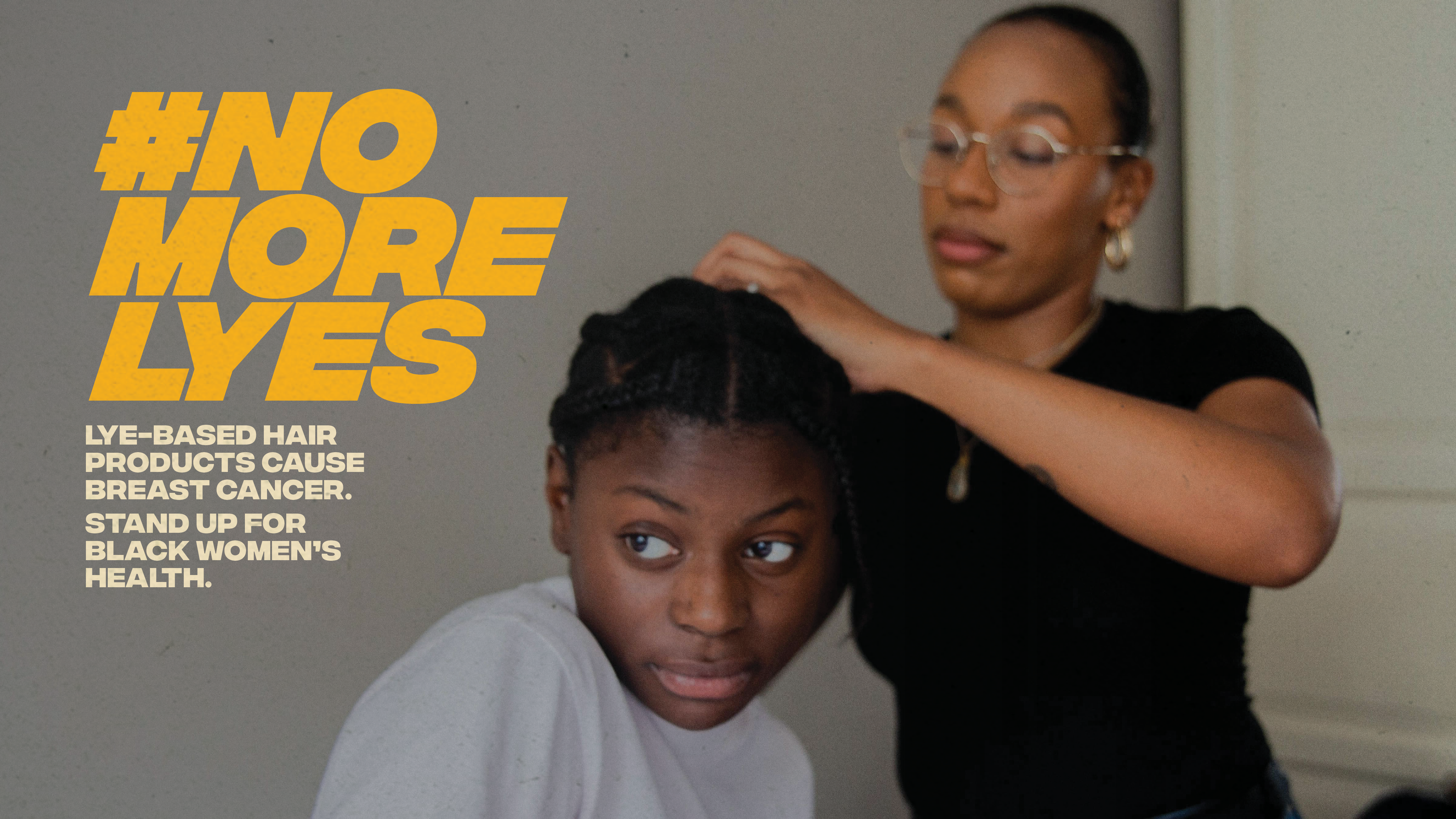#NoMoreLyes: the campaign that wants to put an end to toxic hair products marketed towards Black women
In light of studies showing the link between long-term lye use in hair products and breast cancer in Black women, Level Up wants big beauty brands to take these harmful items off shelves.
Niellah Arboine
13 Aug 2021

photography courtesy of Level Up
It’s no secret: Black women understand products like chemical hair relaxers can irritate and even burn the skin. But until recently, the full extent of the damage these products, often aimed towards Black women, can cause was not widely understood.
A study published in July by Oxford University showed that heavy use of hair relaxers containing the ingredient lye can increase your chances of breast cancer. Lye is an alkali chemical that can be found in paint strippers, silver polish, drain cleaners, soaps and is the co-product of chlorine. And it’s not just hair relaxers you can find lye in, it’s in shampoos and leave-in conditioners too – products predominantly aimed towards Black women.
Now, the feminist campaign group Level Up wants large brands like L’Oréal and Revlon to stop selling products containing toxic ingredients. Seyi Falodun-Liburd, co-director of Level Up, which launched in 2017, spoke to gal-dem about their new petition, what Black people can look out for when buying hair products, and why we need to hold big brands to account.
“We’re basically demanding that L’Oréal and Revlon either remove those toxic ingredients out of hair relaxers and if they can’t do that, then they have to take them off the shelf because they’re not safe,” she says.
“We’re demanding that L’Oréal and Revlon either remove those toxic ingredients out of hair relaxers and if they can’t do that, then they have to take them off the shelf”
Seyi Falodun-Liburd
And why L’Oréal and Revlon? Seyi explains not only do these titan companies own other well-known haircare brands like Dark & Lovely but, “L’Oréal, for instance, have had so many class-action suits around this very thing around particular products.” A recent lawsuit in 2020 saw consumers alleging that certain L’Oréal’s USA Inc. hair relaxers marketed as “no-lye” caused hair loss and scalp irritation.
In a recent study by Independent of hair products aimed at Black women in the UK, lye was found in Classic Rhelaxer by Mizani, Shea Miracle Bouncy Curls Pudding by African Pride, OGX Beauty’s range of shampoos and conditioners, and a number of Dark & Lovely shampoos.
One way to look out for the harmful ingredient is by reading the label, but as Seyi points out, lye has a multitude of different names, making it difficult for the consumer to identify. “Even the products that say that they don’t contain lye, they actually do. Lye is known as sodium hydroxide, but often they just switched the name out,” Seyi says, explaining that the ingredient is also known as sodium hydroxide, calcium hydroxide, magnesium hydroxide or lithium hydroxide.
In a statement to the Independent, a L’Oréal spokesperson said: “The L’Oréal Group is committed to upholding the highest standards of safety for all the products it makes and sells. All the ingredients used in L’Oréal’s products are safe for use as directed and have been subject to a rigorous scientific evaluation of their safety, by our internal experts as well as independent experts.”
Seyi believes more research needs to be done to back up L’Oréal’s claims, “and if they have not done that research, then they need to put money behind doing that research, research that is led by black women for black women.”
“We are giving them our money, we should not be giving them money to kill us”
Seyi Falodun-Liburd
Until these brands do better, “unfortunately the onus is on us,” says Seyi, and the first step is getting the information out there. “As we know with our hair, there is a journey and there is education that we have to do in terms of what we’re actually putting on our heads – lye is the stuff they use to unblock drains.”
Secondly, purchasing from Black-owned and independent brands like Afrocenchix and Big Hair who have Black women’s best interests (and not just their money) at the core of their ethos helps too.
But more than anything, it’s the giant corporations that are responsible. “We are giving them our money,” Seyi says. And she’s right. Black British women spend six times more on hair products than white women – even though only making up 4% of the population of women overall in the UK. “We should not be giving them money to kill us. So, it really is about us, realising and understanding that we have some power and agency in this, and we can say actually we demand better”.
You can sign the #NoMoreLyes petition here.





